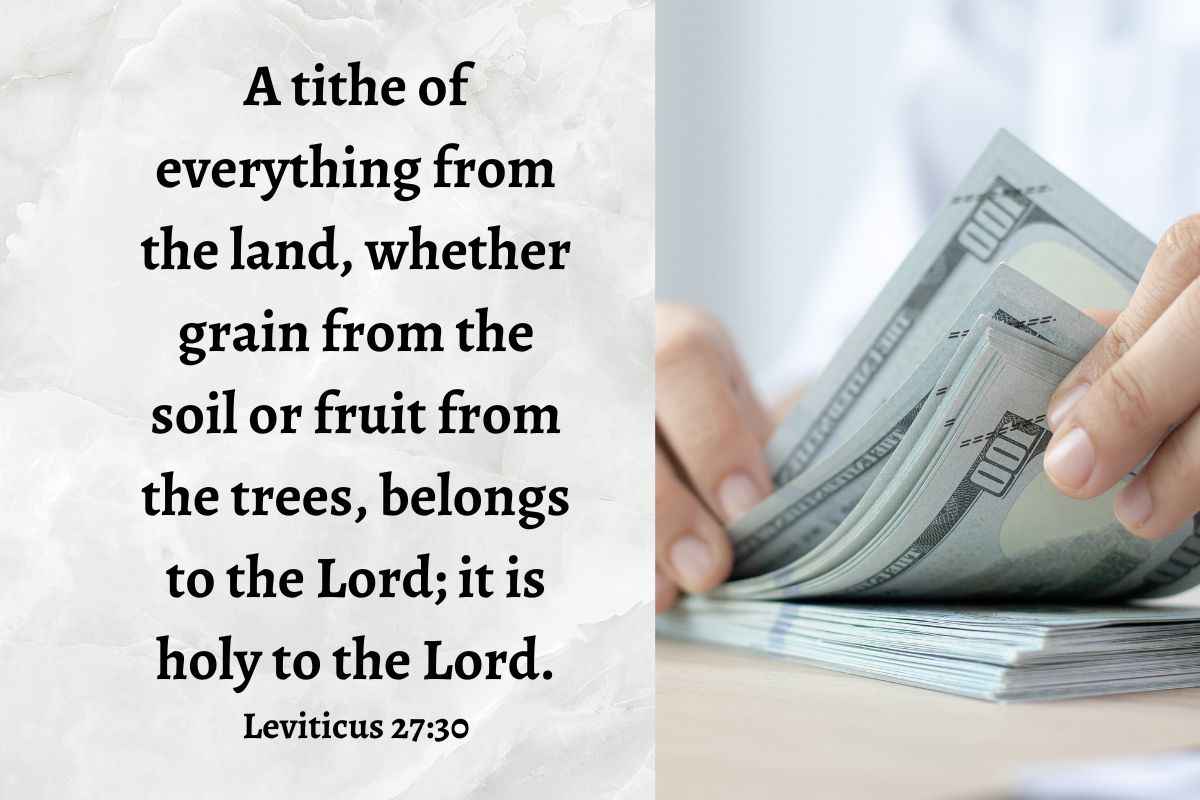The concept of Paying Tithe refers to the practice of giving a portion of one’s income or possessions to support religious institutions or charitable causes. It is often associated with giving ten percent of one’s earnings.
Paying of Tithe is mentioned in several books of the Bible, including Genesis, Leviticus, Numbers, and Deuteronomy, as well as in the teachings of Jesus in the New Testament. The purpose of tithing is to express gratitude to God and support the work of the church or community. It is seen as a form of worship and a way to contribute to the well-being of others.
Where Is Tithe In The Bible
Paying Tithe originated in the Old Testament and was primarily directed towards the Israelites as part of their religious and social responsibilities.
Paying of Tithe In The Old Testament
Various passages outline the obligation to tithe. For example, Leviticus 27 30 states, A tithe of everything from the land, whether grain from the soil or fruit from the trees, belongs to the Lord; it is holy to the Lord.
Similarly, Numbers 18:21 states, I give to the Levites all the tithes in Israel as their inheritance in return for the work they do while serving at the tent of meeting.
Paying of Tithe In The New Testament
In the New Testament, Jesus affirms the principle of giving and generosity. While He does not explicitly command tithing, He emphasizes the importance of caring for others and supporting the work of the church.
In Matthew 23 23, Jesus criticizes the religious leaders for neglecting justice, mercy, and faithfulness while focusing on tithing. He states, “Woe to you, teachers of the law and Pharisees, you hypocrites! You give a tenth of your spices, mint, dill and cumin. But you have neglected the more important matters of the law, justice, mercy and faithfulness. You should have practiced the latter, without neglecting the former.
Purposes Of Paying Tithe With Bible Verses
Paying of Tithe served several purposes. It was a way for the Israelites to demonstrate their gratitude and obedience to God, acknowledging that all they possessed ultimately belonged to Him.
Tithes were used to support the Levites, who were responsible for the religious duties and maintaining the tabernacle or temple. The following are the reasons for Paying of Tithe:
Obedience To God’s Commandments
Bring the whole tithe into the storehouse, that there may be food in my house. Test me in this, says the Lord Almighty, and see if I will not throw open the floodgates of heaven and pour out so much blessing that there will not be room enough to store it. Malachi 3 10
Support For The Work Of The Ministry
In the same way, the Lord has commanded that those who preach the gospel should receive their living from the gospel. 1 Corinthians 9:14
Caring For The Needs Of Others
And if anyone gives even a cup of cold water to one of these little ones who is my disciple, truly I tell you, that person will certainly not lose their reward. Matthew 10:42
Gratitude And Acknowledging God’s Provision
Honor the Lord with your wealth, with the first fruits of all your crops; then your barns will be filled to overflowing, and your vats will brim over with new wine. Proverbs 3:9-10
Trusting In God’s Provision And Blessings
Give, and it will be given to you. A good measure, pressed down, shaken together and running over, will be poured into your lap. For with the measure you use, it will be measured to you. Luke 6 38
Building And Supporting The Community Of Believers
All the believers were one in heart and mind. No one claimed that any of their possessions was their own, but they shared everything they had. Acts 4 32
Helping The Poor And Those In Need
Sell your possessions and give to the poor. Provide purses for yourselves that will not wear out, a treasure in heaven that will never fail, where no thief comes near and no moth destroys. Luke 12:33
The Heart of Tithing
The heart of tithing goes beyond the mere act of giving a portion of one’s income or resources. It encompasses the underlying attitudes, motivations, and beliefs that shape one’s approach to tithing. Here are some key aspects that reflect the heart of tithing:
Gratitude And Thanksgiving
Tithing flows from a heart filled with gratitude towards God for His blessings and provision. It is an expression of thanksgiving for all that He has given and a recognition that everything we have comes from Him.
Trust And Faith
Tithing reflects a heart that trusts in God’s faithfulness and provision. By willingly giving a portion of our income, we demonstrate our confidence that God will continue to provide for our needs and fulfill His promises.
Generosity And Selflessness
The heart of tithing is marked by a spirit of generosity and selflessness. It involves a willingness to share our resources with others, recognizing that we are blessed to be a blessing to others in need.
Surrender And Stewardship
Paying of Tithe involves surrendering our financial resources to God and acknowledging that we are stewards entrusted with managing His blessings. It is a recognition that we do not own our possessions, but rather, we are responsible for using them wisely and for His purposes.
Prioritizing God’s Kingdom
The heart of tithing reflects a deliberate choice to prioritize God’s kingdom and His work over personal desires and material accumulation. It involves aligning our financial decisions with the values and priorities of God’s kingdom.
Joyful Obedience
Paying of Tithe is not meant to be a burden or a legalistic duty, but rather a joyful act of obedience. It is an opportunity to participate in God’s work and experience the joy and fulfillment that comes from giving and contributing to the well-being of others.
Impact And Transformation
The heart of tithing is driven by a desire to make a positive impact and bring about transformation in the lives of individuals, communities, and the world. It recognizes the potential of tithes to support ministries, charitable causes, and initiatives that can bring about positive change.
Blessings And Promises Of Paying of Tithe
Paying of Tithe is often associated with blessings and promises in various religious traditions. While the specific blessings and promises may vary, here are some blessings and promises of tithing:
Abundance And Provision
Many religious teachings highlight the promise of God’s provision and abundance when believers faithfully tithe. It is believed that by honoring God with the tithe, He will open the windows of heaven and pour out blessings that surpass what can be contained (Malachi 3:10).
Protection And Divine Favor
Paying of Tithe is sometimes associated with divine protection and favor. It is believed that through tithing, believers demonstrate their trust and obedience, which can lead to God’s intervention in their lives, safeguarding them from harm or providing divine favor (Malachi 3:11).
Fruitfulness And Multiplication
Tithing is often linked to the promise of fruitfulness and multiplication. It is believed that when individuals faithfully tithe, God blesses them and causes their resources to multiply, leading to increased abundance and prosperity (Luke 6:38).
Financial Stability And Security
Paying of Tithe is seen as a means to attain financial stability and security. The principle is that by putting God first in our finances, He will take care of our needs and ensure that we do not lack (Matthew 6:33).
Spiritual Growth
Paying of Tithe is also associated with spiritual blessings and growth. It is believed that through tithing, believers cultivate a generous and sacrificial spirit, which deepens their relationship with God and opens them up to spiritual blessings and maturity (2 Corinthians 9:6-8).
Honored By God
Paying of Tithe is considered a way to honor God. It is believed that when individuals faithfully tithe, they demonstrate their love, reverence, and obedience to God, which brings them into a closer relationship with Him (Proverbs 3:9-10).
Paying of Tithe And Stewardship
Paying of Tithe and stewardship are closely connected concepts that emphasize the responsible management and use of resources, particularly in a religious context.
While Paying of Tithe refers specifically to the act of giving a portion of one’s income or resources to a religious institution or cause, stewardship encompasses a broader understanding of managing and caring for all aspects of one’s life, including finances, time, talents, and the environment.
Here’s a deeper exploration of the relationship between tithing and stewardship:
Tithing As A Form Of Stewardship
Paying of Tithe can be seen as a specific application of the broader concept of stewardship. By faithfully giving a portion of their resources, individuals demonstrate their commitment to stewarding their finances in accordance with their religious beliefs.
Tithing reflects the recognition that everything ultimately belongs to God, and believers are called to manage their resources wisely and in alignment with His purposes.
Responsible Management Of Resources
Paying of Tithe and stewardship emphasize the responsible management of resources. Tithing encourages individuals to prioritize giving back to their religious community and supporting the work of the ministry.
Stewardship extends this principle to encompass all areas of life, including time, talents, relationships, and the environment. It involves making intentional choices to use resources wisely and for the greater good.
Acknowledging God’s Ownership
Paying of Tithe and stewardship are grounded in the belief that God is the ultimate owner of all things. Paying of Tithe acknowledges God’s ownership by returning a portion of what He has entrusted to us.
Stewardship, in a broader sense, recognizes that all aspects of our lives are gifts from God, and we are called to manage and utilize them in ways that honor and glorify Him.
Cultivating A Generous And Sacrificial Spirit
Paying of Tithe and stewardship foster a spirit of generosity and sacrifice. Tithing involves willingly giving a portion of one’s income, even when it may require sacrifice or adjustment of personal spending.
Stewardship encourages individuals to use their resources in ways that benefit others and reflect a spirit of generosity.
Conclusion
The concept of tithing is indeed found in the Bible. It originated in the Old Testament and involved giving a tenth of one’s income or possessions as an offering to support religious institutions, the priesthood, and the needs of the community. Tithing served as a way for the Israelites to express gratitude to God and fulfill their religious responsibilities.










